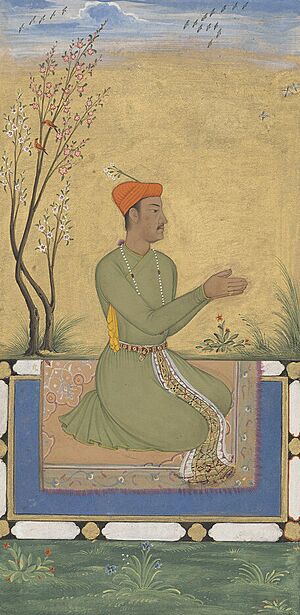Murad Mirza (son of Akbar) facts for kids
Quick facts for kids Murad Mirzaمراد میرزا |
|
|---|---|
| Shahzada of the Mughal Empire | |

Portrait of Murad, c. 1600
|
|
| Born | 15 June 1570 Fatehpur Sikri, Agra |
| Died | 12 May 1599 (aged 28) Mughal Empire |
| Burial | 13 May 1599 Humayun's Tomb |
| Spouse |
|
| Issue |
|
| House | House of Babur |
| Dynasty | |
| Father | Akbar |
| Mother | Concubine |
| Religion | Sunni Islam Din-e-Ilahi |
Murad Mirza (Persian: مراد میرزا) was a prince of the Mughal Empire. He was born on June 15, 1570, and passed away on May 12, 1599. Murad was the second son of the powerful Mughal Emperor Akbar. For his early years, he was cared for by Salima Sultan Begum. Murad Mirza later became the grandfather of Nadira Banu Begum, who married Prince Dara Shikoh.
Contents
Early Life and Learning
Murad was born in Fatehpur Sikri. Because he was born in the mountains of Fatehpur, he was sometimes called "Pahari." For his first few years, he was looked after by Salima Sultan Begum. In 1575, he returned to his mother's care.
Murad received a special education. First, he was taught by Abu'l-Fazl ibn Mubarak. Later, starting in 1580, he was tutored by Jesuit priests. Emperor Akbar himself asked these priests, Antonio de Montserrat and Francisco Aquaviva, to teach Murad. They taught him Portuguese and some basics of Christianity. This made Murad the first Mughal prince to be educated by Western Jesuit priests.
Military Roles
When Murad was just seven years old, in 1577, he was given his first military rank. He was put in charge of 7,000 men. In 1584, when he was older, his rank was increased to 9,000 men.
From 1593, Prince Murad was given command of the Mughal army in the Deccan region. However, he faced challenges in leading the army. Due to these difficulties, he was later replaced by Abu'l-Fazl.
Later Years
Murad Mirza faced a difficult time after a military expedition to Ahmadnagar did not go well. He also experienced sadness after the passing of his son, Rustam.
In February 1599, Murad began a journey towards Ahmadnagar. He passed away on May 12, 1599, near Ahmadnagar.
Family Connections
Prince Murad had several important family connections through his marriages.
Wives and Children
One of Prince Murad's wives was Habiba Banu Begum. She was the daughter of Mirza Aziz Koka, who was also known as Khan Azam. Mirza Aziz Koka was the son of Akbar's milk mother, Jiji Anga. Murad and Habiba Banu Begum were married on May 15, 1587. They had two sons:
- Rustam Mirza, born on August 27, 1588. He passed away on November 30, 1597.
- Alam Sultan Mirza, born on November 4, 1590. He passed away when he was very young.
Another of Murad's wives was the daughter of Bahadur Khan. Bahadur Khan was the son and successor of Raja Ali Khan, who ruled Khandesh. Emperor Akbar arranged this marriage. This was done to get more support from Khandesh for the Mughal Empire's plans in the Deccan.
Daughter's Marriage
Murad's only daughter was Princess Jahan Banu Begum. She married Prince Parviz Mirza, who was the son of Emperor Jahangir. This wedding took place at the palace of Jahangir's mother, Maryam-zamānī.
Places He Governed
Prince Murad also served as a governor in several important regions:
- Malwa from 1590 to 1594
- Berar from 1596 to 1599
- Assam from 1595 to 1597
Images for kids
 | Delilah Pierce |
 | Gordon Parks |
 | Augusta Savage |
 | Charles Ethan Porter |


